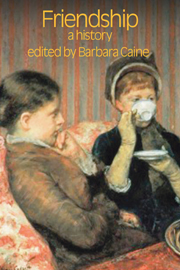Book contents
- Frontmatter
- Contents
- Preface
- Introduction
- 1 The Classical Ideals of Friendship
- 2 Cicero on Friendship
- 3 The Latin West
- 4 Renaissance Friendships: Traditional Truths, New and Dissenting Voices
- 5 From Christian Friendship to Secular Sentimentality: Enlightenment Re-evaluations
- 6 Taking up the Pen: Women and the Writing of Friendship
- 7 Class, Sex and Friendship: The Long Nineteenth Century
- 8 New Worlds of Friendship: The Early Twentieth Century
- 9 The Importance of Friends: The Most Recent Past
- Bibliography
- Index
9 - The Importance of Friends: The Most Recent Past
- Frontmatter
- Contents
- Preface
- Introduction
- 1 The Classical Ideals of Friendship
- 2 Cicero on Friendship
- 3 The Latin West
- 4 Renaissance Friendships: Traditional Truths, New and Dissenting Voices
- 5 From Christian Friendship to Secular Sentimentality: Enlightenment Re-evaluations
- 6 Taking up the Pen: Women and the Writing of Friendship
- 7 Class, Sex and Friendship: The Long Nineteenth Century
- 8 New Worlds of Friendship: The Early Twentieth Century
- 9 The Importance of Friends: The Most Recent Past
- Bibliography
- Index
Summary
The second half of the twentieth century saw the triumph of the particular form of intimate and reciprocal friendship traced in the preceding chapter. In Western societies, and especially in the individualized urban and suburban worlds in which most people made their home, it became more and more common to rely on friends for the kinds of advice, resources and recreation that might once have involved family, kin and neighbours. This form of friendship – both as an experience and as something prescribed in a range of written and visual texts – also came to be characterized by an even greater emphasis on emotional and private rather than practical and public obligations. Now, in the new twenty-first century, friendship may still have practical effects – and even influence people – but gaining advantage or fulfilling obligations are not its chief intentions and in fact could be seen as undermining it. And because friendship is freely chosen, it has become more and more different from other kinds of relationships, in which instrumental benefits or assumed obligations play a larger role, such as those with family, kin, co-workers or neighbours. Indeed, only some of those people will be our friends, and our “real” friends will often help us sort through the difficulties that can arise in those relationships that are chosen for rather than by us. As British sociologist Ray Pahl put it, “friendship is reaching new levels of depth and complexity in the modern world … [and] is suffusing kin and family relationships as never before”.
- Type
- Chapter
- Information
- FriendshipA History, pp. 317 - 356Publisher: Acumen PublishingPrint publication year: 2009



